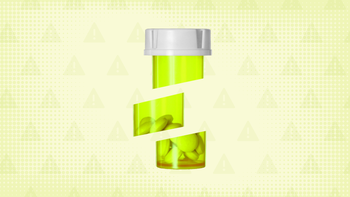
sumatriptan
Sumatriptan nasal spray, also known by its brand names Tosymra and Imitrex, is a triptan medication for adults. It can treat migraine attacks with or without aura. Typically, you spray this medication into the nose at the start of a migraine attack. Sometimes, you might need to give yourself another dose. But using sumatriptan nasal spray more often than recommended can worsen headaches. Some common side effects of sumatriptan nasal spray include burning in the nose, throat irritation, and changes in taste.

What is Sumatriptan nasal spray?
What is Sumatriptan nasal spray used for?
How Sumatriptan nasal spray works
Sumatriptan nasal spray is a triptan. It works by attaching to and turning on serotonin receptors in the blood vessels and nerves in your brain. This causes the blood vessels to tighten as well as lower the release of proteins that cause inflammation and pain. This is thought to help relieve migraines.
Drug Facts
More on Sumatriptan nasal spray essentials

Get your GoodRx coupon

What are the side effects of Sumatriptan nasal spray?
Common Side Effects
- Bad or unusual taste (14-25%)
- Nausea or vomiting (11-14%)
- Nose irritation (3-4%)
Other Side Effects
- Throat irritation
- Dizziness (vertigo)
- Burning feeling
Serious Side Effects
- Seizures
- Stroke: sudden weakness on one side of your body, headache, changes in your speech or vision, confusion
- Brain bleeds: sudden headache, nausea, vomiting, changes in vision or balance, weakness on one side of the body, trouble with movement
- Serotonin syndrome: fast heart rate, dizziness, sweating, flushing, tremor (shakiness), muscle stiffness or twitching, uncoordinated movement, hallucinations
- Allergic reaction: rash or hives, swelling of face or throat, trouble breathing
- Blood vessel spasms: bloody diarrhea, severe stomach pain, loss of vision, tightness or numbness of legs or feet
- Heart attack: dizziness, chest pain or tightness, cold sweat, heartburn, tiredness, nausea, trouble breathing
- Dangerously high blood pressure: anxiety, blurry vision, chest pain, feeling confused, headaches, nausea, vomiting
Source: DailyMed
More on Sumatriptan nasal spray side effects
The following side effects have also been reported
Along with its needed effects, a medicine may cause some unwanted effects. Although not all of these side effects may occur, if they do occur they may need medical attention.
Check with your doctor immediately if any of the following side effects occur:
Less common
Abdominal or stomach pain
blurred vision
changes in patterns and rhythms of speech
chest pain or tightness
chills
confusion
dizziness
fast, slow, irregular, pounding, or racing heartbeat or pulse
headache
muscle cramps and stiffness
neck, throat, or jaw pain
nightmares
shivering
sweating
swelling of the fingers, hands, feet, or lower legs
tightness in the chest
trouble breathing
Rare
Blindness
chest pain or discomfort
chest tightness or heaviness
flushing or redness of the skin, especially on the face and neck
increased blinking or spasms of the eyelid
itching, pain, redness, or swelling
lightheadedness, dizziness, or fainting
nerve pain
severe numbness, especially on one side of the face or body
severe or continuing stomach pain
trouble speaking or swallowing
twitching
unusual bleeding or bruising
vomiting of blood or material that looks like coffee grounds
weakness of the arms and legs
Incidence not known
Agitation
back, leg, or stomach pains
bleeding gums
changes in vision
muscle twitching
pinpoint red spots on the skin
poor coordination
puffiness or swelling of the eyelids or around the eyes, face, lips, or tongue
restlessness
unexplained bleeding or bruising
unusually warm skin
weakness in the arm or leg on one side of the body, sudden and severe
Some side effects may occur that usually do not need medical attention. These side effects may go away during treatment as your body adjusts to the medicine. Also, your health care professional may be able to tell you about ways to prevent or reduce some of these side effects. Check with your health care professional if any of the following side effects continue or are bothersome or if you have any questions about them:
Less common
Burning, crawling, itching, numbness, prickling, "pins and needles", or tingling feelings
change in color vision
change in hearing
difficulty with concentrating
drowsiness
increased sensitivity of the eyes to sunlight
joint pain
muscle aching or cramping
muscle stiffness or tightness
swollen joints
trouble sleeping
Other side effects not listed may also occur in some patients. If you notice any other effects, check with your healthcare professional.
Call your doctor for medical advice about side effects. You may report side effects to the FDA at 1-800-FDA-1088.

Pros and cons of Sumatriptan nasal spray

Pros
Good for people who can't swallow pills or want to avoid injections
Small and easy to carry around
Available in different strengths
Can start to work within about 15 minutes
Lower-cost generic available (Imitrex brand name only)

Cons
Can irritate the nose and throat
Can't be used to prevent migraines
Hasn't been studied in children
Not used to treat cluster headaches like the sumatriptan (Imitrex) injection
Can cause worse headaches if used 10 or more days per month

Pharmacist tips for Sumatriptan nasal spray

Make sure you know how to use sumatriptan nasal spray to avoid wasting the medication and accidentally hurting yourself. Read the Instructions For Use for the medication you're prescribed (Imitrex (sumatriptan) and generic nasal spray or Tosymra (sumatriptan) nasal spray) and ask your provider or pharmacist if you have any questions.
Sumatriptan nasal spray can cause nose or throat irritation. This should go away within 2 hours of taking the dose.
Don't take the sumatriptan nasal spray unit out to test the spray. This medication only has 1 spray in each unit. The dose will be wasted if you test the spray.
Let your provider know if sumatriptan nasal spray doesn’t give you any migraine relief after the first dose. They can help you find out what type of headache you have, and see if there might be better options for you.
If you have migraines multiple times a month requiring treatment with sumatriptan nasal spray, let your provider know. They can consider other medication options to help with your symptoms. If appropriate, they can also recommend medications for migraine prevention.
Don't use sumatriptan nasal spray alone or in combination with other migraine medications for 10 days or more in a month because it can make headaches worse. You might experience daily headaches or more frequent migraine attacks if this happens. Talk to your provider about additional options for migraine relief.
Sumatriptan nasal spray interacts with a lot of commonly used medications. Make sure to let your provider and pharmacist know about all the medications you're taking (including vitamins and supplements) before starting sumatriptan nasal spray so that they can help you check for interactions. If there are any serious interactions, your provider might even switch you to a different migraine medication.
Sumatriptan nasal spray can make you feel sleepy or dizzy. Don't drive or do anything that requires a lot of attention until you know how this medication affects you. Also, don't drink alcohol because this can worsen sleepiness and dizziness.
You might feel tightness, pressure, or pain in the chest, throat, jaw, or neck after taking sumatriptan nasal spray. This usually doesn't last long and will go away. However, these symptoms are very similar to symptoms of a heart attack or heart problems. Tell your provider if you notice these symptoms and they'll let you know if you need more medical attention.

Frequently asked questions about Sumatriptan nasal spray

How to save using GoodRx




What are the risks and warnings for Sumatriptan nasal spray?
Sumatriptan nasal spray can cause some serious health issues. This risk may be even higher for certain groups. If this worries you, talk to your doctor or pharmacist about other options.

Heart problems and high blood pressure
Risk factors: History of heart problems | Age older than 65 | Diabetes | Identified as obese | High blood pressure | Smoking tobacco | Family history of heart disease
Although rare, some people have reported serious heart problems, such as heart attack and heart rhythm problems, within a few hours after taking sumatriptan nasal spray. In addition, sumatriptan nasal spray can raise your blood pressure, rarely to dangerously high levels. If you have a history of heart problems, talk to your provider first to make sure sumatriptan nasal spray is as safe for you as possible. Make sure to check your blood pressure periodically while you're taking sumatriptan nasal spray, and let your provider know if it's higher than usual. Get emergency help right away if you experience a heart attack, severe headache, chest pain, or irregular heartbeat.

Stroke or other brain injury
Some people who've taken triptans like sumatriptan nasal spray have experienced life-threatening strokes or bleeding in the brain. Symptoms of such brain injury include sudden weakness on one side of the body, bad headaches, drooping face, trouble breathing, or changes in your speech or vision. These symptoms can be similar to migraine symptoms, so strokes can be mistaken for a migraine. To lower the risk of making this mistake, it's important that you're properly diagnosed with migraines before you start sumatriptan nasal spray. In addition, people who've had strokes before shouldn't take sumatriptan nasal spray. If you notice symptoms of a stroke, stop taking sumatriptan nasal spray and get medical help as soon as possible, especially if you haven't had a migraine before.

Blood vessel spasms
Sumatriptan nasal spray can cause blood vessel spasms in certain parts of your body. This can lead to serious stomach problems (e.g., stomach pain, bloody diarrhea), vision problems, and changes in sensation in your hands and feet. It can also lead to color changes in your hands and feet (can turn red, white, or bluish depending on how much blood is flowing through). If you notice these symptoms after taking sumatriptan nasal spray, don't take any more medication until you see a provider so they can check out what's going on.

Serotonin syndrome
Risk factors: Taking other medications that raise serotonin levels in your brain
Some people taking sumatriptan nasal spray have developed a rare, but potentially life-threatening condition called serotonin syndrome. This condition happens where there's too much serotonin in the brain. Your risk for serotonin syndrome goes up if you use sumatriptan nasal spray with other medications that can raise your serotonin levels, such as certain antidepressants, mental health medications, pain medications, and migraine medications.
Let your provider know about all the medications you take before starting sumatriptan nasal spray, as well as any medications you plan to take. Symptoms of serotonin syndrome include fast heart rate, sweating, muscle stiffness or spasms, fever, and confusion. Get medical help right away if you have any of these symptoms.

Allergic reactions
Allergic reactions to sumatriptan nasal spray are possible, including life-threatening reactions like facial swelling, shock, and anaphylaxis (closing of the throat). If you notice dizziness, difficulty breathing, a choking sensation, nausea, swelling around your eyes, or swelling of the lips or tongue after using sumatriptan nasal spray, get medical attention as soon as possible.

Seizures
Risk factors: History of seizures or epilepsy
Some people have had seizures after taking sumatriptan nasal spray. This has happened in people who have a history of seizures, but can also happen in people who've never had them as well. Get medical help right away if you have a seizure while taking sumatriptan nasal spray.

Nose or throat irritation
Sumatriptan nasal spray might cause irritation in the nose and throat, which can include burning, numbness, tingling sensation, runny nose, pain or soreness. These symptoms are usually temporary and goes away in less than 2 hours, but let your provider know if this continues to bother you.
More on Sumatriptan nasal spray warnings

Sumatriptan nasal spray dosage forms
Typical dosing for Sumatriptan nasal spray
Sumatriptan nasal spray: The typical dose is either 5 mg, 10 mg, or 20 mg. The 5-mg and 20-mg doses are given as a single spray in one nostril. The 10-mg dose is given by spraying 5 mg once in each nostril. If your migraine doesn't go away or comes back, you can take a second dose at least 2 hours after your first dose. The maximum dose is 40 mg in a 24-hour period.
Tosymra (sumatriptan) nasal spray: The typical dose is 10 mg given as a single spray in one nostril. If your migraine doesn't go away or comes back, you can take up to two more doses given at least 1 hour apart. The maximum dose is 30 mg in a 24-hour period.
More on Sumatriptan nasal spray dosage forms

How much does Sumatriptan nasal spray cost?

Sumatriptan nasal spray contraindications
Certain conditions that cause an irregular heart rhythm (arrhythmias)
History of stroke or transient ischemic attack ("mini-stroke")
History of hemiplegic or basilar migraines (because of higher risk of stroke)
Uncontrolled high blood pressure
Use of ergot-containing or ergot-type medications like dihydroergotamine (Migranal) or other triptans in the last 24 hours
Currently take or have taken a monoamine oxidase inhibitor (MAOI), such as selegiline, in the last 14 days
Severe liver problems (e.g., cirrhosis)

What are alternatives to Sumatriptan nasal spray?
Treatment of migraine attacks with or without aura in adults
Short-term treatment of migraines with or without aura in adults

What is the latest news about Sumatriptan nasal spray?

Sumatriptan nasal spray images
Get savings updates for Sumatriptan nasal spray
Receive price alerts, news, and other messages from GoodRx about Sumatriptan nasal spray and other healthcare topics and relevant savings offers.By providing your email, you consent to receive marketing communications from GoodRx, which may include content and/or data related to men’s health, women's health, reproductive care, or sexual health. You agree to the GoodRx Terms of Use and acknowledge the Privacy Policy. You can unsubscribe at any time.
References
Best studies we foundDrugs and Lactation Database (LactMed). (2021). Sumatriptan. National Institute of Child Health and Human Development.
Feuerstadt, P. (2019). Small bowel ischemia overview. American College of Gastroenterology.
GlaxoSmithKline LLC. (2023). Imitrex- sumatriptan spray [package insert]. DailyMed.
Kadian, R., et al. (2023). Basilar migraine. StatPearls.
Källén, B., et al. (2001). Delivery outcome in women who used drugs for migraine during pregnancy with special reference to sumatriptan. Headache.
Kumar, A., et al. (2023). Hemiplegic migraine. StatPearls.
Lannett Company, Inc. (2022). Sumatriptan- sumatriptan spray [package insert]. DailyMed.
Tonix Medicines, Inc. (2023). Instructions for use.
Upsher-Smith Laboratories, LLC. (2023). Tosymra- sumatriptan spray [package insert]. DailyMed.
Browse medications
View AllResearch prescriptions and over-the-counter medications from A to Z, compare drug prices, and start saving.

















